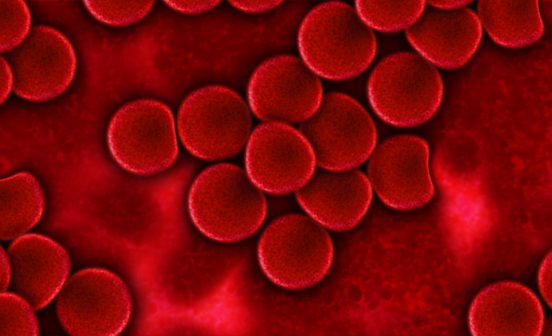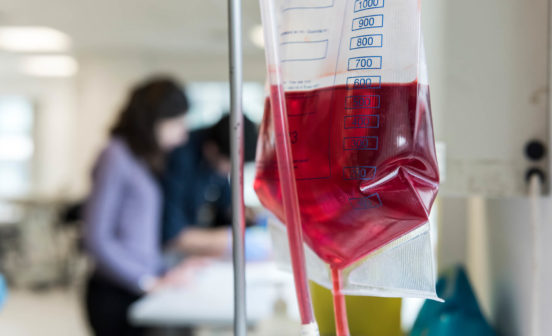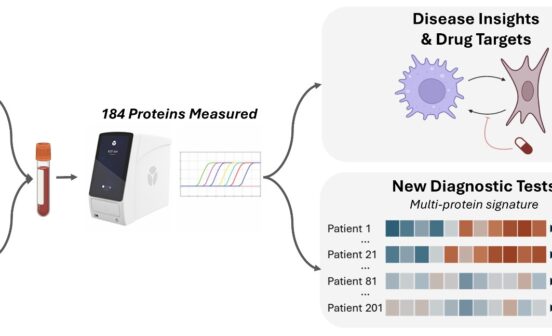The Immunology Theme studies chronic immune disorders that have a significant health and economic burden due to their potential to cause organ failure and the requirement for complex immunosuppression protocols. We aim to ensure timely and accurate diagnosis; to fully optimise immunosuppression treatment; and to explore novel therapeutics.
Why is this Research Needed
Our Theme focuses on diseases relevant to our local population grouped into (i) antibody-mediated disorders; (ii) thrombo-inflammation; (iii) glomerulonephritis and (iv) renal transplantation. We combine the world-leading immunology and inflammation expertise within the academic Centres for Inflammatory Disease and Haematology with the translational research expertise of our multidisciplinary Clinical Centres. The Theme sits within Imperial College’s Department of Immunology and Inflammation – news updates from the Department can be found here.
Theme Aims
- Precision medicine for immune thrombocytopenia and Systemic Lupus Erythematosus to improve diagnostics; treatment pathways; and clinical outcome.
- Identify molecular signatures of disease relapse in Giant Cell Arteritis
- Define the role of endothelial dysfunction in the development of vascular disease in Antiphospholipid Antibody Syndrome
- Utilise diagnostic renal pathology to develop novel biomarkers in glomerulonephritis
- Optimise outcome in renal transplantation by personalised drug treatments derived from the individual risk of rejection and the development of non-invasive diagnostic tests, a patient-defined priority.
The detailed Theme objectives can be found here.
Upcoming /Ongoing Projects within the Theme
We have exciting pilot projects led by our early-stage researchers and all focus on improving the outcome of patients with these conditions. These projects include:
- Can T-cell receptor sequencing and gene expression profiling deliver personalised therapy in Immune Thrombocytopenia? Led by Dr Amna Malik, supervised by Dr Nichola Cooper
- Endothelial dysfunction in thrombotic autoimmune disorders Led by Dr Deepa Arachchillage
- Optimizing B cell therapy response in lupus through comprehensive characterization of peripheral blood immune cells. Led by Dr Norzawani Buang and supervised by Dr James Peters and Prof Matthew Pickering
- Spatial Transcriptomic analysis of temporal artery biopsies to identify novel therapeutic targets and biomarkers in Giant Cell Arteritis. Led by Dr Robert Maughan and supervised by Dr James Peters
- Identifying Novel Treatment Targets in Minimal Change Disease. Led by Dr Charli Seneschall and supervised by Profs Megan Griffith and Matthew Pickering
- Clinical Implementation of New Markers of Kidney Disease. Led by Dr Candice Roufosse.
- Spatial Transcriptomics for the Investigation of Antibody-Mediated Injury in Kidney Transplants. Led by Dr Candice Roufosse.
We have also supported the following Fellowship Applications:
- Minimising allosensitisation to red blood cell transfusions in people with a transplant or on the transplant wait-list for Katrina Spensley
We have extensive expertise in Kidney Transplantation led by Drs Michelle Willicombe and Candice Roufosse and our work is internationally recognised for developing biomarkers of kidney rejection risk, with several publications on transcript analysis of biopsy material to improve diagnosis, on the clinical impact of allo-sensitisation following blood transfusion, and on the characterisation and effects of de novo development of antibodies against the transplant. Work is now focussing on translating risk markers and new biomarkers into clinical diagnostic tools via clinical trials and international collaborations (www.icdot.org) (https://banfffoundation.org/). Our remit also includes investigations of radiological features of rejection (flow-MRA), the role of autoimmunity in rejection, and other non-invasive biomarkers of rejection, a key priority for patients. Through collaboration with the Digital Health theme, we are also exploring machine learning applications in digital pathology to improve diagnosis, with a strong focus on patient involvement.
Patient and Public Involvement, Engagement and Participation
We have recruited Community Partners with lived experience of the conditions within our Theme and held our first meeting on the 28th of June 2023. Our partners will help co-produce our research and provide expertise in the patient perspective on all our translational research initiatives. We hold specific events on PPIE and a recent example is “Digital Pathology and AI: Learning what matters to patients who have undergone a kidney transplant”
Equality, Diversity and Inclusion
Our researchers are based in the Department of Immunology and Inflammation and the department has an active EDI committee
The Department of Immunology and Inflammation holds an Athena Swan Silver Award and our mission statement is to create a diverse, inclusive and supportive academic community committed to promoting scientific excellence and nurturing the next generation of researchers. The principles we adhere to are Transparency and consistency, Equality and diversity, Professional behaviour and Scientific integrity
Publications
- The role of CD8+ T-cell clones in immune thrombocytopenia
- Steroid Sparing Maintenance Immunosuppression in Highly Sensitised Patients Receiving Alemtuzumab Induction
- Application of the Banff Human Organ Transplant Panel to kidney transplant biopsies with features suspicious for antibody-mediated rejection
Our Community Partners
In accordance with the Imperial BRC’s PPIEP Strategy , our theme has recruited a group of Community Partners to act as critical friends to our theme and share their valuable lived experience with our researchers and health professionals to help improve the relevance and quality of our research for the benefit of our North West London population.

Benjamin Ward
The Theme sits within Imperial College’s Department of Immunology and Inflammation – news updates from the Department can be found here.
Key Individuals
-
Professor Matthew Pickering
Theme Lead, Immunology -
Professor Nichola Cooper
Theme Lead, Immunology -
Dr Amna Malik
Research Associate - Theme Committee Member -
Dr Candice Roufosse
Clinical Reader in Renal Pathology - Theme Committee Member -
Dr Deepa Jayakody Arachchillage
Honorary Clinical Senior Lecturer - Theme Committee Member -
Dr Jessica Strid
Professor of Cellular Immunology -
Dr Maria Prendecki
Clinical Lecturer - Theme Committee Member - EDI Champion -
Dr Megan Griffith
Consultant Nephrologist -
Dr Michelle Willicombe
Clinical Reader in Renal Pathology - Theme Committee Member - PPIE Theme Lead -
Dr Nicholas Medjeral-Thomas
Honorary Clinical Research Fellow - Theme Committee Member -
Dr Stephen McAdoo
Consultant Nephrologist and Honorary Clinical Senior Lecturer -
Dr Tom Cairns
Consultant Nephrologist -
Professor Frederick Tam
Ken and Mary Minton Chair of Renal Medicine / Consultant Nephrologist -
Professor Liz Lightstone
Professor of Renal Medicine -
Professor Marina Botto
Professor of Rheumatology




















